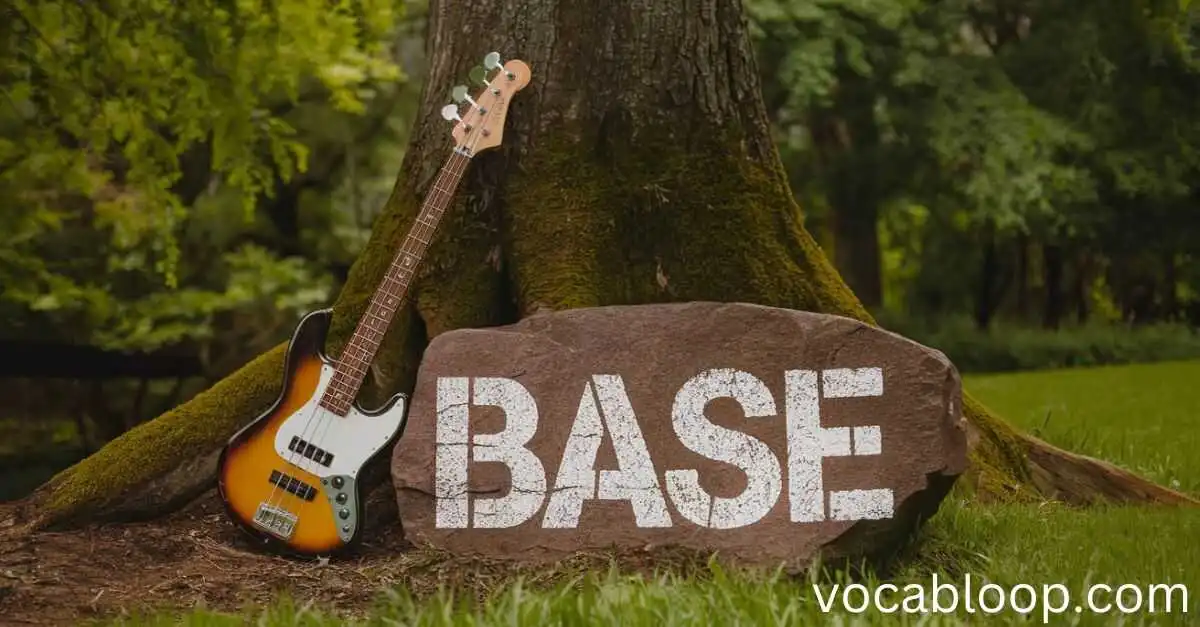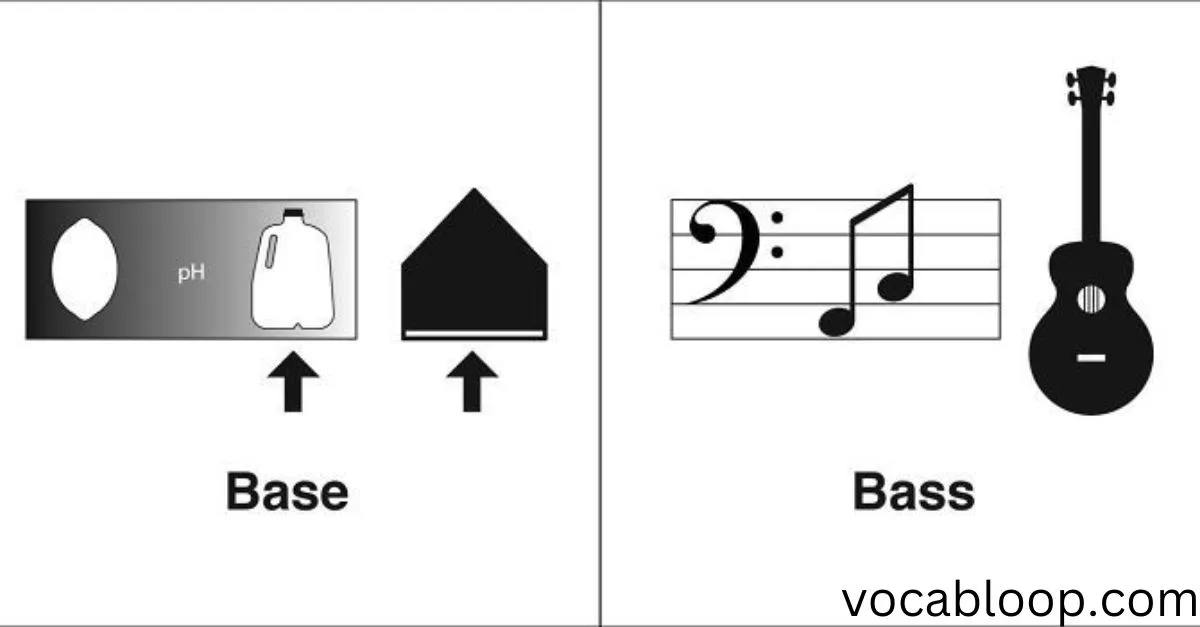Understanding the difference between base vs bass can be tricky, as these words are homophones—they sound alike but have distinct meanings. Base refers to a foundation, support structure, or starting point, often used in construction, science, or abstract concepts. On the other hand, bass describes low-frequency sounds, the lowest male voice, or a type of freshwater fish commonly targeted in bass fishing.
The confusion often stems from their pronunciation, particularly in American English, where bass (for music) sounds like “base.” However, when referring to fish, bass rhymes with “mass.” By understanding their meanings, pronunciations, and contexts, you’ll avoid common errors and communicate effectively. Whether discussing a musical scale, construction support, or a core principle, this guide simplifies the difference for clarity.
What is There Confusion Base vs Bass?

The confusion arises because base and bass are often pronounced the same, especially in American English. Despite their similar sounds, they are entirely different in meaning. Base refers to the foundation or starting point, while bass can describe low-frequency sounds, the lowest male voice, or even a type of freshwater fish. Their varied meanings, combined with their similar pronunciation, make them easy to mix up.
For example, in music, people often say “bass” (rhyming with “face”) when they mean the musical scale bass, which refers to low-pitched sounds. Similarly, in construction or chemistry, “base” is often mistaken for “bass” due to phonetic similarities.
Is the Base Word Correct?

The base word for each term depends on its context and usage. Colombia is always correct when referring to the South American country known for its rich cultural heritage, coffee from Colombia, and diverse landscapes. It derives from Christopher Columbus’s name, honoring his historical significance.
On the other hand, Columbia is correct in English-speaking contexts such as Columbia University, the Columbia River, or Columbia, Missouri. It represents a proper noun usage distinct from the country. Understanding the difference is key, as misspelling “Colombia” as “Columbia” can confuse readers and dilute the importance of each term’s unique identity.
Definition:
The word base is a noun, verb, or adjective, depending on the context. As a noun, it refers to a support structure, fundamental element, or starting point. As a verb, it means to build or establish something on a foundation.
Meaning:
The meaning of base can vary. It might refer to the bottom support of an object, the core structure in a chemical reaction (like in base in chemistry), or the fundamental base of an idea. For instance, in construction, the base layer is essential for stability.
Usage:
“Base” is used in numerous ways. A construction support is called a base, as is the structural base of a building. In sports, baseball has “bases” that runners must reach. It’s also common in science, like in chemistry, where it describes a substance that reacts with acids.
Is the Bass Word Correct?

The base word for Colombia and Columbia comes from Christopher Columbus, but their meanings have diverged. Colombia is the correct spelling for the South American nation, renowned for its biodiversity, Colombian coffee, and vibrant traditions. Meanwhile, Columbia is a term often used in the United States to name places, institutions, or features, like Columbia University, the Columbia River, and towns across the country.
The spelling difference reflects their distinct identities. While “Columbia” honors Columbus in a broader sense, Colombia represents a country with a unique history, geography, and national pride. Using the correct spelling ensures clarity and respect.
Definition:
The word bass is primarily a noun and can refer to the lowest part of a musical range, the lowest male voice, or a type of freshwater fish.
Meaning:
In music, bass represents the low-pitched sound or the musical range below baritone. When discussing fish, bass refers to species like largemouth or smallmouth bass, popular in bass fishing.
Usage:
“Bass” is often used in music to describe the audio spectrum that includes low-frequency sounds. For example, subwoofers amplify bass notes in music. In fishing, bass fishing is a favorite sport in North America, involving species like largemouth bass.
Quick Summary Base vs Bass
| Aspect | Base | Bass |
| Definition | Foundation or starting point | Low-frequency sounds or freshwater fish |
| Pronunciation | Rhymes with “face” | Rhymes with “mass” (fish) or “face” (music) |
| Usage | Support structure, chemistry, ideas | Music, vocal range, fishing |
Base vs Bass as Parts of Speech
Base serves as a noun, verb, and adjective, while bass is mostly a noun or adjective. For instance, “base” might refer to the bottom support of a building, while “bass” describes the lowest male voice or a low-pitched sound.
The key is recognizing their function in a sentence. For example:
- “He stood on the base of the mountain.”
- “The bass guitarist played a deep melody.”
Pronunciation of Base vs Bass

The word “bass” often causes confusion due to its dual pronunciation. When referring to music, like a bass guitar or bass notes, it rhymes with “base,” creating a smooth and familiar sound. However, when “bass” describes the fish, it rhymes with “mass,” aligning with its zoological roots.
This dual nature can puzzle learners and even native speakers, especially in written contexts where pronunciation clues are absent. To avoid mistakes, remember that musical bass aligns with “base,” while bass as a fish takes a softer “mass” sound. Understanding this distinction ensures clarity in speech and writing.
Side-by-Side Comparison Base vs Bass
| Feature | Base | Bass |
| Meaning | Foundation, starting point | Musical range, low-frequency sound |
| Parts of Speech | Noun, verb, adjective | Noun, adjective |
| Examples | Base in chemistry, construction | Bass fishing, lowest male voice |
Which One is More Acceptable Base vs Bass?
Both base and bass are correct but serve entirely different purposes based on context. Base refers to a foundation, core principle, or support structure, as in “the base of a pyramid” or “the base of an argument.” It signifies something fundamental or essential.
On the other hand, bass relates to music or fishing. In music, bass describes the lower range of sound, such as “bass guitar” or “bass notes,” while in fishing, it refers to the species, like “catching a bass.” Matching the word to its context is essential to ensure clear and accurate communication.
Base in British English and American English
In both British and American English, base retains its meaning as a foundation object or fundamental base. However, regional phrases might differ. For example, “military base” is universal, but informal uses may vary.
Bass in British English and American English
For bass, differences lie in pronunciation. In British English, “bass” for music often leans towards “mass,” while American English blends it with “base.” Both dialects, however, agree on its meaning in music and fishing.
Common Mistakes and How to Avoid Them
One mistake is confusing base with bass in writing or speech. A helpful pronunciation guide can solve this. For example, remember that “bass” in music aligns with “base,” but as a fish, it follows “mass.”
Trick to Remember the Difference Base vs Bass

A simple trick to remember the difference between base and bass is to associate base with stability, such as the “base of operations” or a foundation. On the other hand, think of bass as related to depth, like “bass notes” in music or “deep sea bass” in fishing.
A handy mnemonic is “Bass swims deep,” connecting the word to its meanings of low tones and underwater creatures. This method makes distinguishing these homophones much easier.
Origins of Base vs Bass
The word base has its origins in the Latin word basis, meaning foundation or pedestal. It was used to describe the underlying support or structure of an object or concept. Over time, it evolved in various languages to encompass meanings related to the starting point or fundamental part of something, such as in base layer, foundation, or core.
On the other hand, bass comes from the Middle English word basse, which was used to describe low tones or low-pitched sounds in music. It also referred to certain species of fish, especially the large freshwater bass. The word’s use in music stems from its association with deep or low-frequency sounds, and in fishing, it refers to a specific type of fish. Both words have different origins but are often confused due to their similar pronunciation in modern English.
Synonyms of Base vs Bass
Base:
- Foundation
- Core
- Bottom
- Support
- Footing
- Basis
- Pedestal
- Groundwork
- Base layer
- Substructure
Bass:
- Baritone
- Low tone
- Tenor
- Contrabass
- Largemouth
- Smallmouth
- Bass guitar
- Bassoon
- Subwoofer
- Bassline
Sentences in Daily Usage of Base vs Bass

Base:
- The base of the tower is made of stone.
- In chemistry, a base neutralizes an acid.
- The team used the old warehouse as a base of operations.
- The cake had a base layer of chocolate.
- He built his argument on a strong base of evidence.
- The soldiers returned to their military base.
- The lamp’s base was cracked.
- This recipe forms the base for many desserts.
- They provided a solid base for the project.
- The sculpture sits on a marble base.
Bass:
- The bass notes of the song were very powerful.
- He plays bass in a local band.
- The fisherman caught a largemouth bass.
- The bass in the choir had the deepest voice.
- Bass fishing is a popular sport in the USA.
- The subwoofer amplifies the bass.
- The bass part of the harmony stood out.
- She loves listening to bass-heavy music.
- The bass guitar added depth to the melody.
- He prepared a delicious bass for dinner.
FAQs
What is the main difference between base and bass?
Base refers to a foundation or starting point, while bass relates to low sounds or a freshwater fish. They have distinct meanings and cannot be used interchangeably.
Why is bass pronounced differently in music and fishing?
In music, bass is pronounced like “base” due to its Italian origin (basso). For fishing, bass rhymes with “mass,” following standard English rules.
Can base and bass be used interchangeably?
No, their meanings are completely different despite similar pronunciations in some contexts.
What are tips to avoid confusing these words?
Link base to stability (e.g., “base of operations”) and bass to depth (e.g., “bass notes”). Mnemonics like “Bass swims deep” can help.
How are base and bass pronounced in different English dialects?
In most dialects, base is pronounced as “bayss,” while bass in music sounds like “base,” and in fishing rhymes with “mass.”
Conclusion
Understanding base vs. bass is essential for clear communication. Base refers to a foundation, support structure, or starting point, while bass relates to low-frequency sounds, the lowest male voice, or a type of freshwater fish. Their similar pronunciation often causes confusion, but recognizing their distinct meanings and contexts helps avoid mistakes.
Whether you’re discussing a core structure, a musical scale, or bass fishing, knowing the difference ensures precise language. With practice, these homophones become easy to master!

Alex Hormozi is a seasoned blogger at Vocab Loop, known for his deep insights into language, vocabulary, and grammar. With years of experience in writing, Alex shares practical tips and effective strategies to help readers improve their linguistic skills and enhance their writing abilities.

